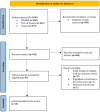Perceptions of, Barriers to, and Facilitators of the Use of AI in Primary Care: Systematic Review of Qualitative Studies
- PMID: 40560641
- PMCID: PMC12242059
- DOI: 10.2196/71186
Perceptions of, Barriers to, and Facilitators of the Use of AI in Primary Care: Systematic Review of Qualitative Studies
Abstract
Background: Artificial intelligence (AI) has the potential to transform primary care by reducing the considerable bureaucratic burden. However, clinicians and patients share concerns regarding data privacy, security, and potential biases in AI algorithms.
Objective: This study aimed to provide an in-depth understanding of primary care professionals' and patients' perceptions of, barriers to, and facilitators of the use of AI in primary care.
Methods: We conducted a systematic review of qualitative studies using MEDLINE (via PubMed), Web of Science, and Scopus databases from inception to June 9, 2024. We used the Sample, Phenomenon of Interest, Design, Evaluation, and Research Type (SPIDER) tool to design the systematic search strategy for qualitative studies. Eligible studies included qualitative analyses-based on interviews, focus groups, or similar methods-of perceptions of, barriers to, and facilitators of the use of AI in primary care, involving primary care professionals or patients. Exclusion criteria included studies on clinical decision support systems, reviews, commentaries, editorials, conference abstracts, and non-English or non-Spanish publications. Methodological quality was assessed using the Joanna Briggs Institute checklist. A thematic synthesis approach was used to structure the results, and the Grading of Recommendations Assessment, Development, and Evaluation-Confidence in the Evidence From Reviews of Qualitative Research (GRADE-CERQual) tool was used to assess the confidence in each finding.
Results: We analyzed 316 participants, including primary care physicians, patients, and other health care professionals, from 13 studies across 6 countries selected from 942 screened records. We identified four analytical themes using thematic synthesis: (1) change in the physician-patient relationship, highlighting concerns about loss of empathy, connection, and trust; (2) AI as a partner for efficient time and information management, including its potential to improve workflow and decision-making, alongside skepticism about increased workload; (3) data as the cornerstone of AI development, reflecting concerns about data privacy, quality, bias, and corporate responsibility; and (4) barriers to and facilitators of AI in primary care, emphasizing equity, accessibility, and stakeholder co-design. The GRADE-CERQual assessment provided high confidence in all themes except theme 4, which was rated as moderate confidence.
Conclusions: This meta-synthesis includes the perspectives of primary care physicians and patients, but further research is needed on the perspectives of other professionals. Moreover, there was heterogeneity in methods and sampling strategies. This first systematic review synthesizing qualitative evidence on AI perceptions in primary care provides a comprehensive understanding of related barriers and facilitators. The key themes identified suggest that AI may help address workload, decision-making, and data management, improving health care efficiency while ensuring ethical, patient-centered care.
Trial registration: PROSPERO CRD42024560048; https://www.crd.york.ac.uk/PROSPERO/view/CRD42024560048.
Keywords: artificial intelligence; family practice; general practice; physicians; primary health care; qualitative evidence synthesis; qualitative research; systematic review.
©Héctor Martínez-Martínez, Julia Martínez-Alfonso, Belén Sánchez-Rojo-Huertas, Valeria Reynolds-Cortez, Andrea Turégano-Chumillas, Victoria A Meseguer-Ruiz, Shkelzen Cekrezi, Vicente Martínez-Vizcaíno. Originally published in the Journal of Medical Internet Research (https://www.jmir.org), 25.06.2025.
Conflict of interest statement
Conflicts of Interest: None declared.
Figures
References
-
- Lysaght T, Lim HY, Xafis V, Ngiam KY. AI-assisted decision-making in healthcare: the application of an ethics framework for big data in health and research. Asian Bioeth Rev. 2019 Sep;11(3):299–314. doi: 10.1007/s41649-019-00096-0. https://europepmc.org/abstract/MED/33717318 96 - DOI - PMC - PubMed
-
- National Academies of Sciences, Engineering, and Medicine; Health and Medicine Division; Board on Health Care Services; Committee on Implementing High-Quality Primary Care. Robinson SK, Meisnere M, Phillips RL Jr, McCauley L. Implementing High-Quality Primary Care: Rebuilding the Foundation of Health Care. Washington, DC: National Academies Press (US); 2021. - PubMed
Publication types
MeSH terms
LinkOut - more resources
Full Text Sources



